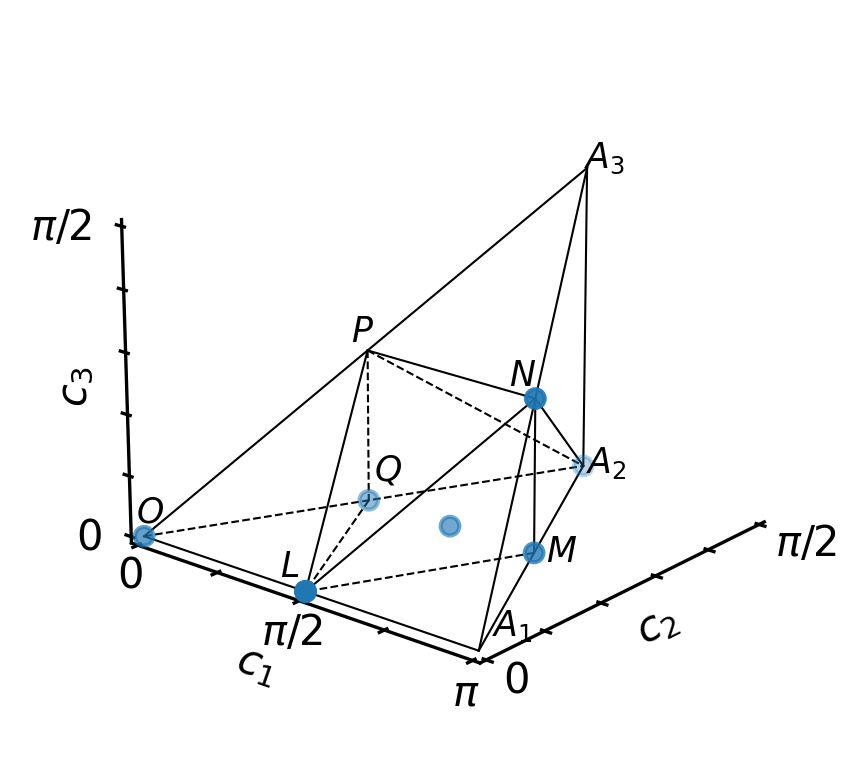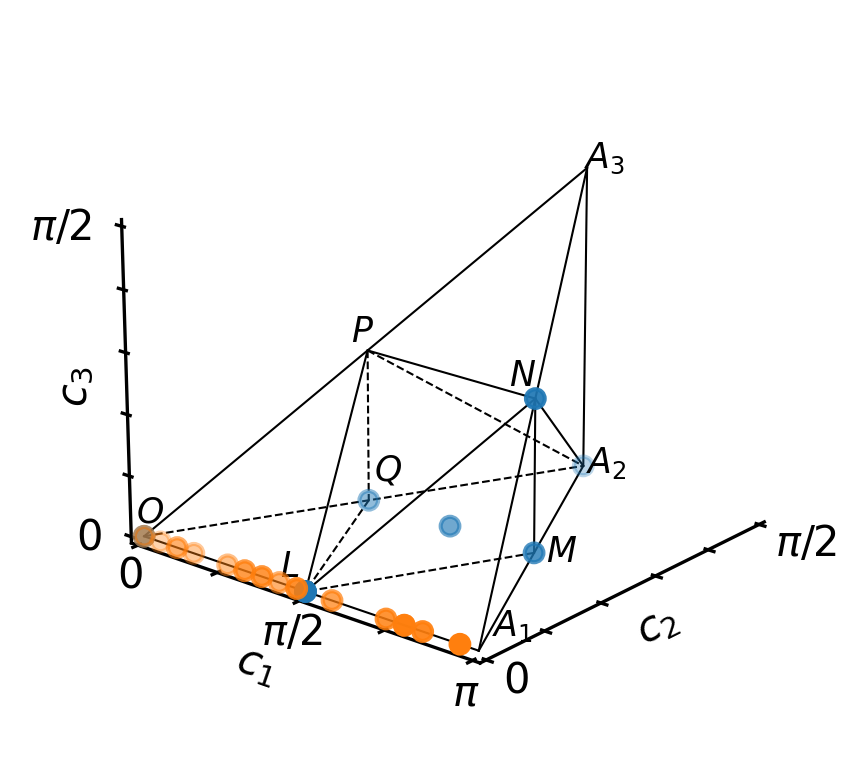Tutorial¶
[1]:
# NBVAL_IGNORE_OUTPUT
%load_ext watermark
import numpy as np
import qutip
import matplotlib
import matplotlib.pylab as plt
import weylchamber
from weylchamber.visualize import WeylChamber
%watermark -v --iversions
Python implementation: CPython
Python version : 3.9.7
IPython version : 8.1.1
numpy : 1.21.2
qutip : 4.6.3
matplotlib : 3.5.1
weylchamber: 0.3.2+dev
\(\newcommand{Re}[0]{\operatorname{Re}} \newcommand{Im}[0]{\operatorname{Im}} \newcommand{dd}[0]{\,\text{d}} \newcommand{abs}[0]{\operatorname{abs}}\)
Every two-qubit gate is associated with a point in the “Weyl-chamber” that may be visualized in three dimensions as the following polyhedron:
[2]:
WeylChamber().plot()

Note: if you run this interactively, and switch to an interactive matplotlib backend, e.g.
%matplotlib tk
you will be able to rotate the 3D plot to get a better intuition.
Consider the following common two-qubit gates:
[3]:
IDENTITY = qutip.identity([2,2])
IDENTITY
[3]:
[4]:
CNOT = qutip.qip.operations.cnot()
CNOT
[4]:
[5]:
CPHASE = qutip.qip.operations.cphase(np.pi)
CPHASE
[5]:
[6]:
BGATE = qutip.qip.operations.berkeley()
BGATE
[6]:
[7]:
iSWAP = qutip.qip.operations.iswap()
iSWAP
[7]:
[8]:
sqrtISWAP = qutip.qip.operations.sqrtiswap()
sqrtISWAP
[8]:
[9]:
sqrtSWAP = qutip.qip.operations.sqrtswap()
sqrtSWAP
[9]:
[10]:
MGATE = weylchamber.canonical_gate(3/4, 1/4, 0)
MGATE
[10]:
All of these gates are situatated at special points in the Weyl chamber. We can print their Weyl chamber coordinates and add a point in the graphical representation
[11]:
w = WeylChamber();
list_of_gates = [
('Identity', IDENTITY),
('CNOT', CNOT), ('CPHASE', CPHASE), ('BGATE', BGATE),
('iSWAP', iSWAP), ('sqrtISWAP', sqrtISWAP),
('sqrtSWAP', sqrtSWAP), ('MGATE', MGATE)]
print("Weyl Chamber Coordinates")
print("----------------------------------")
for (name, gate) in list_of_gates:
c1, c2, c3 = weylchamber.c1c2c3(gate)
print("%10s: \t%.2fπ %.2fπ %.2fπ" % (name, c1, c2, c3))
w.add_point(c1, c2, c3)
w.plot()
Weyl Chamber Coordinates
----------------------------------
Identity: 0.00π 0.00π 0.00π
CNOT: 0.50π 0.00π 0.00π
CPHASE: 0.50π 0.00π 0.00π
BGATE: 0.50π 0.25π 0.00π
iSWAP: 0.50π 0.50π 0.00π
sqrtISWAP: 0.25π 0.25π 0.00π
sqrtSWAP: 0.75π 0.25π 0.25π
MGATE: 0.75π 0.25π 0.00π

The gates locally equivalent to the controlled-phase gates are on an the axis 0 - A1 in the Weyl chamber:
[12]:
w.scatter(*zip(*[
weylchamber.c1c2c3(qutip.qip.operations.cphase(phase))
for phase in np.linspace(0, 2*np.pi, 20)]))
[13]:
w.plot()

The Weyl chamber coordinates \((c_1, c_2, c_3)\) are closely associated with the local invariants \((g_1, g_2, g_3)\)
[14]:
print("Local Invariants")
print("----------------------------------")
for (name, gate) in list_of_gates:
g1, g2, g3 = weylchamber.g1g2g3(gate)
print("%10s: \t%5.2f %5.2f %5.2f" % (name, g1, g2, g3))
Local Invariants
----------------------------------
Identity: 1.00 0.00 3.00
CNOT: 0.00 0.00 1.00
CPHASE: 0.00 0.00 1.00
BGATE: 0.00 -0.00 0.00
iSWAP: 0.00 0.00 -1.00
sqrtISWAP: 0.25 0.00 1.00
sqrtSWAP: 0.00 -0.25 0.00
MGATE: 0.25 0.00 1.00
This shows that the MGATE and \(\sqrt{\text{iSWAP}}\) are actually locally equivalent, despite being different Weyl chamber coordinates (M and Q, respectively)
